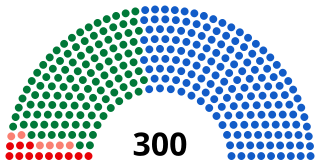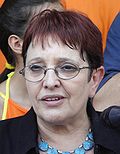
George Andreas Papandreou is a Greek American politician who served as Prime Minister of Greece from 2009 to 2011.

Konstantinos G. Simitis, usually referred to as Costas Simitis or Kostas Simitis, is a Greek politician who served as Prime Minister of Greece and was leader of the Panhellenic Socialist Movement (PASOK) from 1996 to 2004.

The Panhellenic Socialist Movement, known mostly by its acronym PASOK is a social-democratic political party in Greece.

Konstantinos Mitsotakis was a Greek politician who was Prime Minister of Greece from 1990 to 1993. He graduated in law and economics from the University of Athens.
Tzannis Tzannetakis was a Greek politician who was briefly Prime Minister of Greece during the political crisis of 1989.

Antonis Samaras is a Greek politician who was Prime Minister of Greece from 2012 to 2015 and leader of New Democracy from 2009 to 2015. Samaras previously served as Minister of Finance in 1989, as Minister of Foreign Affairs from 1989 to 1992, and as Minister of Culture and Sport in 2009.
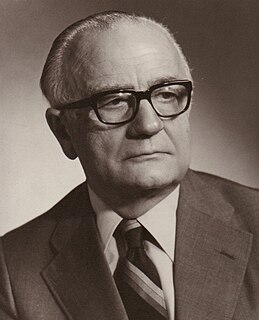
Parliamentary elections were held in Greece on 17 November 1974. They were the first after the end of the Greek military junta of 1967–1974 and took place during the metapolitefsi era. The winner was Konstantinos Karamanlis and his newly formed conservative party, ND. Karamanlis had already formed a government of national unity just after the fall of the dictatorship. The second biggest party was the centrist Center Union - New Forces. Third power in the Parliament became the newly formed PASOK, a radical socialist party led by Andreas Papandreou, son of the former prime minister Georgios Papandreou.

Parliamentary elections were held in Greece on 20 November 1977. After Prime Minister Constantine Karamanlis called for early elections, his New Democracy party suffered a significant loss of power. However, Karamanlis managed to secure an absolute majority in the Parliament. The big surprise was the success of PASOK, whose socialistic rhetoric remained radical. Because of PASOK's success, the Centrists led again by Georgios Mavros lost half of their power. As a result, Andreas Papandreou, PASOK's leader, became a prominent figure in Greek politics. The Communists and the Nationalists managed to amplify their support.
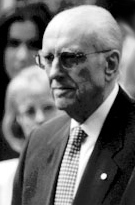
Parliamentary elections were held in Greece on Sunday, 18 October 1981. The Panhellenic Socialist Movement (PASOK), led by Andreas Papandreou, faced New Democracy, led by Georgios Rallis. Papandreou achieved a landslide and PASOK formed the first socialist government in the history of Greece.
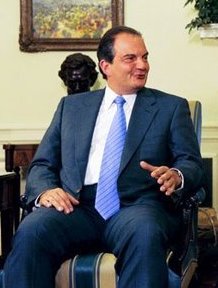
Parliamentary elections were held in Greece on Sunday, September 16, 2007, to elect the 300 members of the Hellenic Parliament. The leading party for a second term was New Democracy under the leadership of Kostas Karamanlis with 41.83%, followed by George Papandreou and Panhellenic Socialist Movement (PASOK) with 38.10%. New Democracy managed to secure an absolute but narrow majority of 152 out of 300 parliament seats. The populist Popular Orthodox Rally entered the parliament for the first time with 10 seats, while the parties of the left, the Communist Party of Greece (KKE) and the Coalition of the Radical Left (SYRIZA), enjoyed a significant increase in their votes. KKE got 8.15% of the votes and secured 22 parliament seats and SYRIZA got 5.04% of the votes (+1.78%) and 14 seats.
In early 2006, Prime Minister Kostas Karamanlis announced ruling New Democracy's initiative for a new amendment of the Greek Constitution of 1975/1986/2001, and clarified his propositions speaking to the deputies of his party on 11 May 2006.
A leadership election was held on November 11, 2007 in the Panhellenic Socialist Movement (PASOK), Greece's main centre-left party, after it was defeated in the parliamentary election earlier that year. The incumbent, George Papandreou, had stated right after the general elections that he would ask party members to renew their confidence in him, while Evangelos Venizelos and Kostas Skandalidis also declared themselves candidates.

Parliamentary elections were held in Greece on 4 October 2009. An election was not required until September 2011.

The 2009 New Democracy leadership election was held on 29 November 2009, following the official announcement of the resignation of Kostas Karamanlis, after more than 12 years as leader of New Democracy, the main centre-right political party and one of the two major parties in Greece.

The May 2012 Greek legislative election was held in Greece on Sunday, 6 May, to elect all 300 members to the Hellenic Parliament. Under the constitution, it was due to be held in late 2013, four years after the previous election; however, an early election was agreed under the November 2011 agreement to form a coalition government, formed with a remit to ratify and implement decisions taken with other Eurozone countries and the International Monetary Fund (IMF) a month earlier.

The June 2012 Greek legislative election was held in Greece on Sunday, 17 June, to elect all 300 members to the Hellenic Parliament in accordance with the constitution, after all attempts to form a new government failed following the May election. If all attempts to form a new government fails, the constitution directs the president to dissolve a newly elected parliament, and then to call for new parliamentary elections within 30 days of the dissolution. The president announced at 16 May the date for the new election, and signed the formal decree to dissolve the parliament and call for the election at 19 May.

Indirect presidential elections were held in Greece in December 2014 and February 2015 for the succession to Karolos Papoulias as the President of Greece. The candidate of the ND–PASOK government, Stavros Dimas, failed to secure the required majority of MPs of the Hellenic Parliament in the first three rounds of voting in December. According to the provisions of the Greek Constitution, snap elections were held on 25 January 2015, which were won by the far-left SYRIZA party. Following the convening of the new parliament, the presidential election resumed, and on 18 February 2015, veteran ND politician Prokopis Pavlopoulos, backed by the SYRIZA-ANEL coalition government, was elected with 233 votes.
